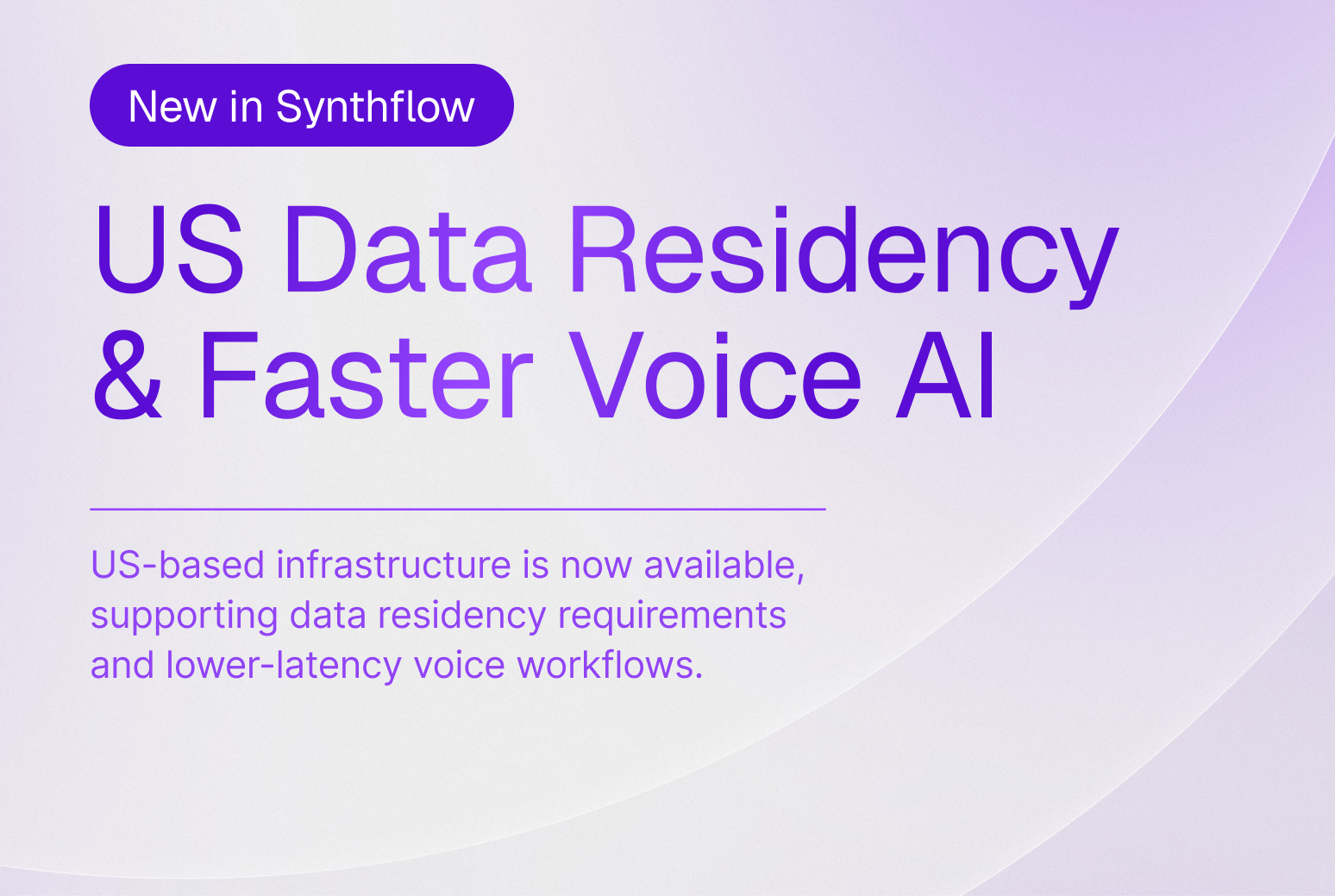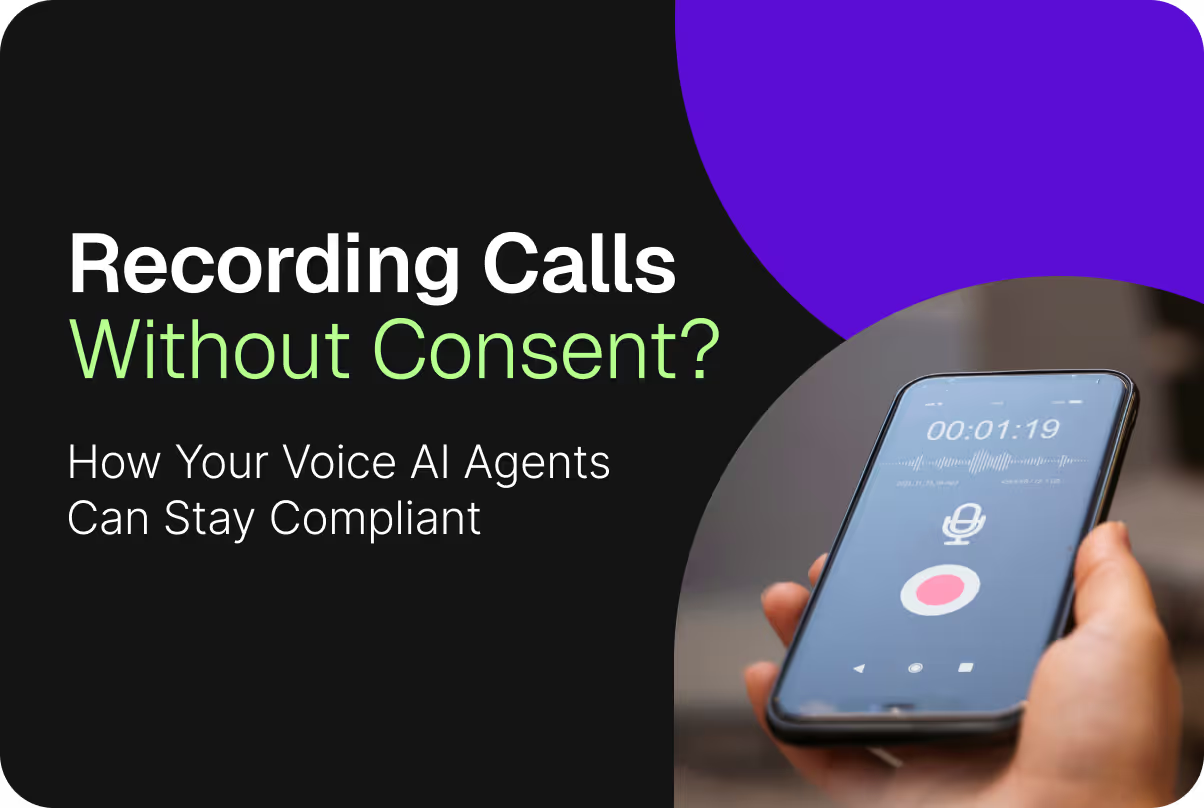Are you looking for a parloa alternative? If yes, this guide is for you.
Parloa is a platform that lets you build entity-level AI voice agents that are trained on the company’s specific terminologies and offer deep integrations with internal systems and multi-channel capability across phone systems, apps, websites, and smart devices.
The platform is designed to automate customer communications across multiple channels–including voice, email, and instant messaging—helping businesses reduce costs, improve efficiency, and enhance customer satisfaction.
While parloa offers many features and integrations, the platform falls short on some key aspects of service quality, including slow deployments, long deployment cycles, high latency, and non-transparent pricing.
This kind of defeats the whole purpose of AI phone calling, doesn't it?
Thankfully, today, we're here to discuss incredible parloa alternatives that can help you take your AI-powered conversation to the next level.
In this guide, we'll examine the top parloa alternatives and compare their functionality, features, and overall performance.
Why look beyond Parloa?
Parloa positions itself as a platform for creating AI-voice agents to improve customer service. It promises to automate routine tasks such as scheduling customer appointments, addressing FAQs, managing sales calls, and more, all without human intervention. Sounds great, right?
Well, not quite right.
Despite its ambitious attempts, it struggles to meet user expectations. Here are some common issues its users have reportedly faced with Parloa-
Slow deployments
Deployment in an AI voice agent refers to the extended time it takes to get an AI voice agent fully operational and available for use.
Users report that parloa requires several hours for initial setup, demanding meticulous configuration of conversation flows and integration guidelines. Many times the total deployment time can take 1–3 months or more, which is quite high compared to other tools.
Parloa also requires developer assistance for full implementation, as no-code options are limited to Zapier integrations.
Non-transparent pricing
Parloa offers custom pricing tailored to each business's specific needs and scale. Pricing depends on many factors, such as the size of the organization, integration complexity, and required services, making it suitable for startups as well as established enterprises.
Looks perfect, right? But it's actually now.
The process of determining a tailored price often involves lengthy discussions, legal agreements, and technical assessments, increasing the sales cycle and operational overhead.
Custom pricing also comes with high upfront costs and large initial investment, which is not an affordable solution for customers who are not ready to commit significant capital without clear evidence of return on investment.
High latency
Voice AI systems must respond with minimum delay to deliver a smooth conversational experience. High-speed AI systems drive retention rates (up to 67%), operational cost savings (30–40%), and customer satisfaction.
Research shows that people start to detect lag around 100 to 120 milliseconds, and conversation flow begins to break down not much longer after that. A response taking longer than a quarter of a second can start to feel slow or mechanical.
Parloa takes 700ms or higher, which is much higher than the optimal latency rate. With Parloa, the responses feel delayed, and users grow frustrated. Pauses can make the system appear unresponsive, causing users to interrupt, repeat their statements, or even abandon the interaction altogether.
Limited Voice Specialization
Parloa, being NLP-centric, primarily processes text-based language data rather than real-time audio signals.
This means it can analyze, understand, and generate language in written form but lacks the specialized algorithms and hardware integration needed for live voice input, such as speech recognition or voice cloning in real time.
NLP systems without audio processing capabilities cannot effectively perform complex tasks like diagnosing voice disorders or performing voice rehabilitation.
What to Look for in a Parloa Alternative?
Before you discuss the Parloa alternatives in 2024, let's consider the features you should look for when choosing your next AI-powered voice agent.
Transparent & Low Pricing
Even the voice assistant with the best features won't stand a chance if it's not cost-efficient.
The voice provider and AI assistant are the two most expensive parts of an AI caller. Some platforms require you to purchase a set amount of minutes every month. So, depending on your requirements and the configuration you want to go for, choose the platform that offers it the cheapest.
Sub-500ms latency
In the context of AI agents, latency refers to the time difference between when an agentic system receives a command and when it responds to it. Every millisecond brings your AI closer to human cadence, leading to higher user satisfaction, more seamless interactions and stronger engagement.
A reply that takes more than 500ms is slow. Real-time systems like voice agents handling time-sensitive tasks rely on instant processing to prevent frustration and dropped calls. In healthcare, financial services or emergency responses can affect outcomes and decisions.
<4-week deployments
The time required to deploy an AI voice agent depends significantly on the complexity of the project, the level of customization, and the readiness of the underlying infrastructure.
In very simple scenarios such as deploying a static, pre-built voice assistant with minimal customization the process can take as little as a few minutes to a few days.
For agencies and businesses that deploy complex voice agents with complex scenarios and reusable templates, AI voice agents can often be delivered in 2 to 4 weeks.
Also, it's best to look for an AI voice agent that can help you deploy faster and scale quicker as your business grows. Deployment is not the end continuous Support and maintenance are also essential for long-term success.
Multilingual voice cloning
Voice cloning enables brands to create custom AI-powered assistants that match a specific brand's voice or personality. Powered by Natural Language Processing (NLP) and multilingual speech recognition technologies, these systems can respond, interpret, and understand customer queries in real time–regardless of their language or accent.
Top Parloa alternatives to consider in 2025
After evaluating several AI voice platforms, we've compiled a list of top alternatives to Parloa that stand out for their features, user satisfaction and performance. Let's explore each of these solutions in detail.
Synthflow AI
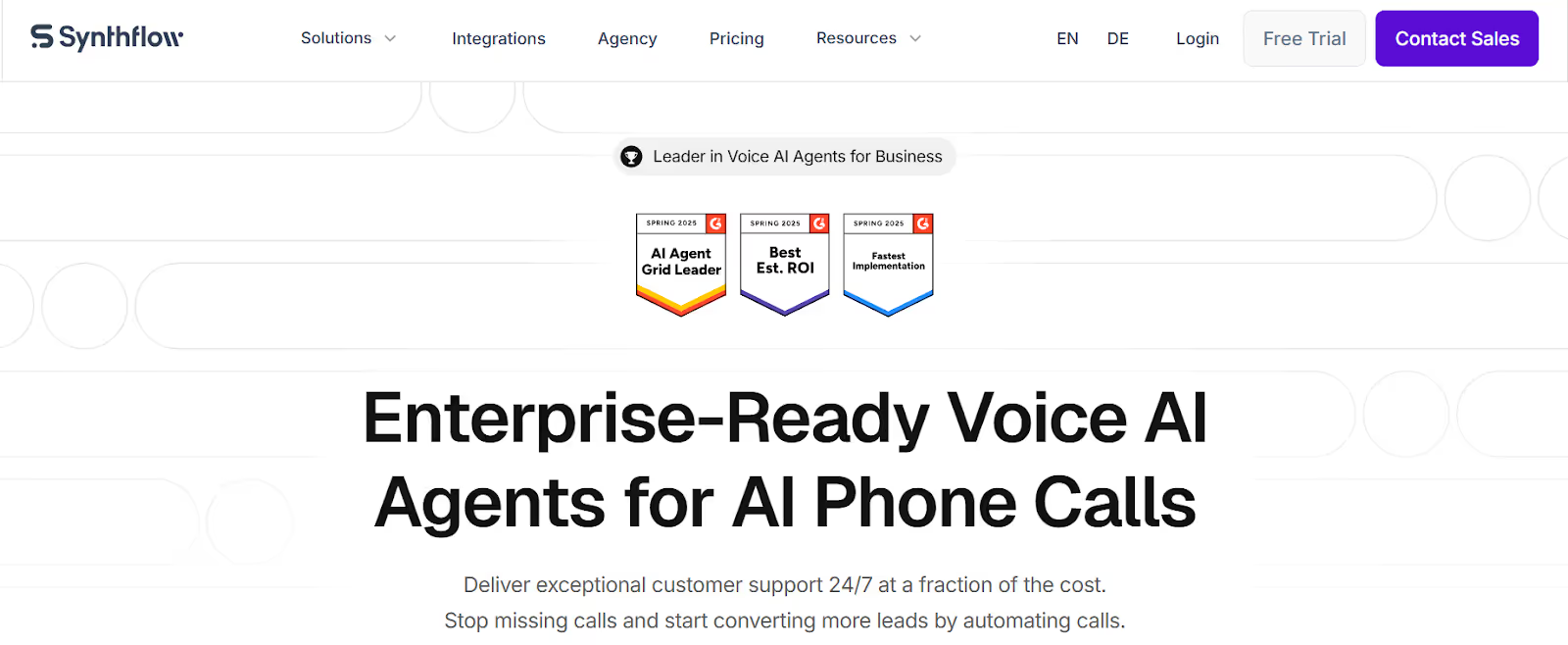
Synthflow's no-code and enterprise-ready capabilities set it apart from all Parloa alternatives. it handles over 45 million voice calls per month across 30+ countries, showing it’s built for both scale and reliability. Plus, it ranks as the #4 AI agents worldwide on G2; earning badges for fastest implementation and best estimated ROI.
Synthflow AI provides a drag-and-drop interface that allows users to set up a voice agent in minutes, regardless of any programming knowledge or coding ability. This accessibility is pivotal for businesses of all sizes looking to adopt AI voice agents without the need for a technical team.
Unlike Parloa AI, Synthflow provides the maximum customization with pre-built templates, custom integrations, and workflows that are tailored to your specific needs. This flexibility enables them to optimize their voice agents according to their business needs.
Its features are highly advanced compared to those of its competitors, and its use cases are well-suited for any business looking to automate aspects of its sales and marketing seamlessly.
Synthflow AI features:
- Extensive voice library: Synthflow AI offers 11Labs integration to boost its voice capabilities. Businesses can choose from hundreds of different voices and accents—from Australian and British to Argentinian Spanish to support effective communication. You can even clone your voice. This makes it a versatile tool for growing global businesses.
- Integration capabilities: Synthflow AI offers integration capability to some of the most powerful integration capabilities, including Hubspot, GoHighLevel, Zapier, ClickFunnels, Cal.com and Make.com. Plus, businesses can use Zapier to access over 7,000 apps and save time on scheduling, lead generation, and more.
- Customer support and security: Synfthflow’s security is locked down with end-to-end encryption, keeping all data protected during calls. Enterprise clients (on Growth and Agency plans) get exclusive access to a private Slack channel with 24/7 client support. You'll have a one-on-one relationship with our support team, with personalized assistance whenever you need it.
- Low latency: Responds in about 500 ms, keeping conversations natural, real-time, and human-like.
- Stage recognition: This feature enables the AI voice agent to recognize different stages of conversation and adjust its behavior accordingly. It is particularly helpful for structured interactions like sales or customer support teams where customers don't like to repeat the same conversations.
- Telephony options: Supports SIP trunking, Twilio, webcalls, and Bring Your Own Carrier (BYOC), offering flexibility in how you set up and manage your voice infrastructure.
- Multilingual language: Synthflow offers support for 90+ languages, enabling businesses to connect with global audiences seamlessly.
Pros:
- Automated voice calls, no code needed
- Zero latency, excellent call quality and consistency, conduct large volumes of calls
- Text-to-speech and advanced transcription features
- 11labs integration– voice cloning and automatically scheduling appointments into your calendar
- Robust customer support
- Advanced call sorting, logging and transferring
- Generate responses and action them live in call
- Resell Synthflow - fully white-labelled version available
- CRM Integrations - High Level, HubSpot
- Top AI models (GPT4 & GPTo) included in all tiers of Pricing
- Use Synthflow outbound and inbound calling, automated appointment booking, and outbound lead qualification voicebox.
- Best for businesses of all sizes
- Excellent customer reviews
Ideal Synthflow AI use cases
With Synfthlow AI, businesses have a plethora of customizable voices suitable for various applications, from AI phone call systems to AI IVR and AI answering bots. From appointment booking and call transfer to lead qualification and promotional engagement, Synthflow AI can do it all.
For various industries, Synthflow AI can help in different ways:
- Real estate - Book meetings even when you're not available and only transfer a call through to the team if the lead's actually hot.
- AI receptionist - Use AI to book appointments and answer customer queries.
- Hospitality & Retail - Book tables, set up booking reminders, and automatically provide the latest opening hours and updates with Synthflow.
- Healthcare - Schedule appointments, collect basic symptoms data and get the AI to route calls to various professionals based on triage.
Why choose Synthflow AI over Parloa?
Synthflow's versatility and ease of use empower developers and content creators to implement voice technology efficiently, ensuring that every digital interaction is as human-like and engaging as possible.
It's a telephony system that handles everything: calling, post-call actions, contact management, and lead tracking. This means you can quickly scale your calling efforts without worrying about lead management and calling efficiency.
Sierra AI
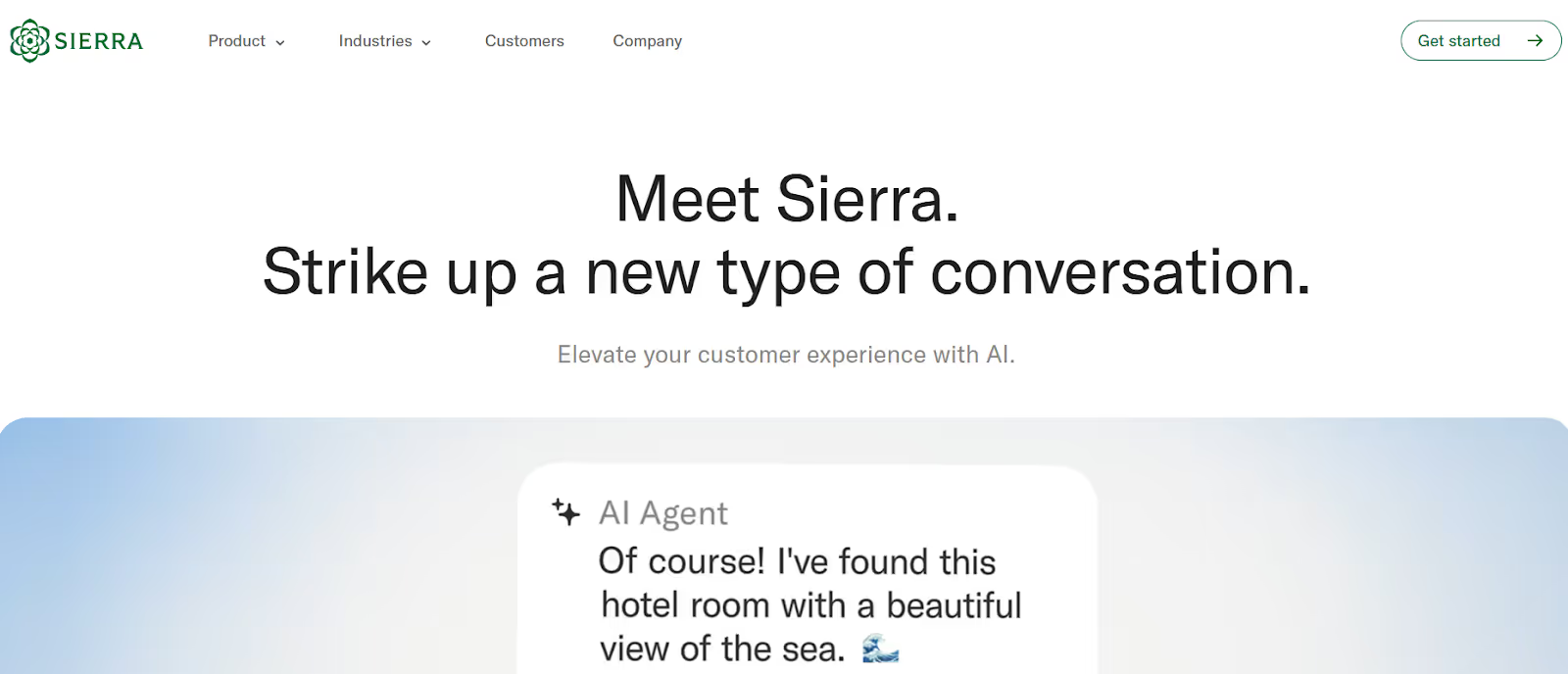
Sierra AI enables businesses to build AI agents tailored to their brand identity, policies, and customer needs. These agents go beyond simple chatbots, offering dynamic, context-aware interactions that can handle complex customer inquiries and perform real actions such as updating CRM entries or managing orders across integrated business systems.
Sierra's platform leverages a constellation of large language models (LLMs) from providers like OpenAI, Anthropic, and Meta, ensuring high reliability and adaptability. Its core technologies include Natural Language Processing (NLP), machine learning and neural networks (support patterns and recognition according to customer expectations).
Sierra AI features:
- Multi-Model AI integration: Sierra leverages multiple large language models (LLMs) from providers like OpenAI, Anthropic, and Meta to ensure high reliability.
- Personalized, brand-aligned agents: Agents can be customized to reflect a company's unique voice, tone, and values. They understand brand-specific terminology and adapt to customer emotions, ensuring interactions are both authentic and empathetic.
- Continuous learning and improvement: Sierra agents utilize analytics and adaptive learning to refine their responses over time, ensuring ongoing enhancement of customer interactions.
- Robust security and compliance: Sierra AI emphasizes data privacy through encryption, strict access controls, and secure integrations.
Pros:
- Empathetic customer experience
- Real-time problem-solving and action
- Integration and scalability to handle millions of interactions without loss of quality
- Strong data governance, encryption, and auditing capabilities
- Dedicated Support
- Real time problem-solving
Cons:
- Complex setup
- Requires a significant amount of data and continuous training to perform efficiently
- The sophisticated features of Parloa come at premium pricing
Ideal Sierra AI use cases
Sierra AI offers an omnichannel platform that helps businesses manage customer interactions across various platforms, including social media, chat, emails and ticketing systems. The platform is ideal for businesses that prioritize comprehensive omnichannel communication like e-commerce, retail, travel and hospitality.
Why choose Sierra AI over Parloa?
Unlike Parloa, Sierra supports multi-channel communication (chat, email, social media), making it versatile for various customer support environments. Its advanced NLP engine maintains conversational context and adapts to nuances in language, improving the naturalness and coherence of interactions.
Poly AI
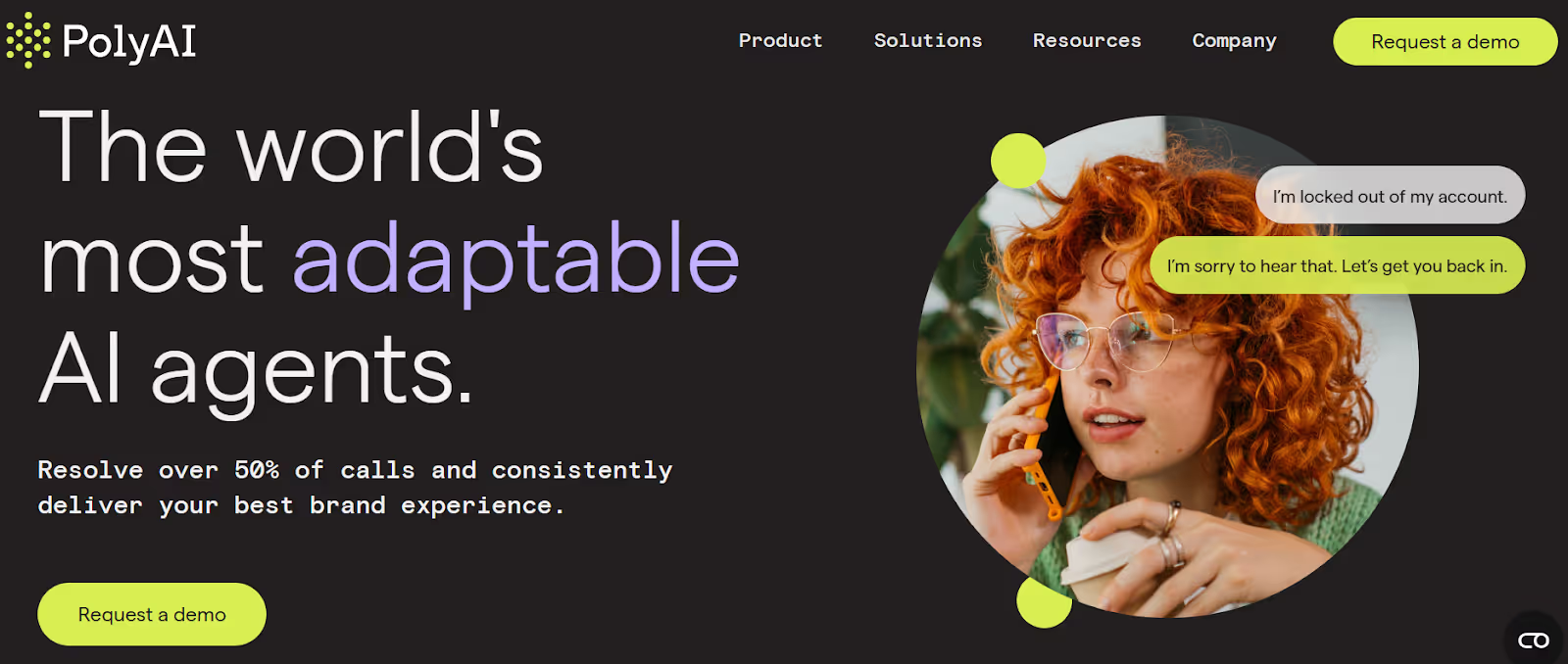
Poly AI delivers AI solutions that empower businesses to provide exceptional customer service that is personalized, instant, multilingual and on any channel. These assistants can understand and respond to customers regardless of accents, dialects, or speaking style, allowing for open-ended conversations where users can speak freely, interrupt, or change topics without confusion.
Poly AI has also created its own proprietary LLM called ConveRT. The ConveRT model is trained on millions of conversational samples, making it around 10% more accurate in low-data settings than models from IBM Watson, Rasa and Google Dialogflow.
Poly AI features:
- Centralized platform: This feature allows you to construct and deploy voice agents through an intuitive low-code user interface. This component enables business users to define virtual agent logic through key features such as Flows, Playbooks, Lexicons, and Intents.
- Multilingual Support: The platform supports over 45 languages, making it suitable for global businesses with diverse customer bases.
- In-house dialogue management: Poly AI utilizes a proprietary dialogue management system coupled with its own NLU (natural language understanding) models. This system excels at understanding intent without predefined lists.
- Fully customizable: Poly AI typically co-creates its AI voice agent, including designing a custom “on-brand” voice persona. It also integrates seamlessly with existing customer relationship management (CRM) systems and other enterprise platforms.
Pros:
- Supports over 45 international languages
- Seamless integration with existing CRM and call center solutions like Salesforce, Zendesk, Twilio, and AWS Connect.
- Deployment within six weeks.
- 24*7 availability
- 99.9% uptime SLAs on phone lines
- Real-time insights with no data gaps, no manual data compilation, and no more making business decisions based on guesswork.
Cons:
- Technically demanding, requiring detailed configuration and high-quality training data.
- Usage-based pricing lacks transparency
- Lack of deeper insights into customer sentiment and call behavior.
Ideal Poly AI use cases
PolyAI serves industries with high call volumes, such as banking, hospitality, insurance, retail, telecommunications, healthcare, and travel. Its solutions help automate routine customer inquiries, reduce wait times, and allow human agents to focus on complex or sensitive issues.
Why choose Poly AI over Parloa?
Poly AI’s voice assistants are pre-trained to automate common use cases (like authentication, order management, billing, and reservations) without extensive retraining. Real-world deployments have shown Poly AI handling over 80% of calls without escalation to a live agent and achieving up to 87% call containment on launch.
Kore.ai
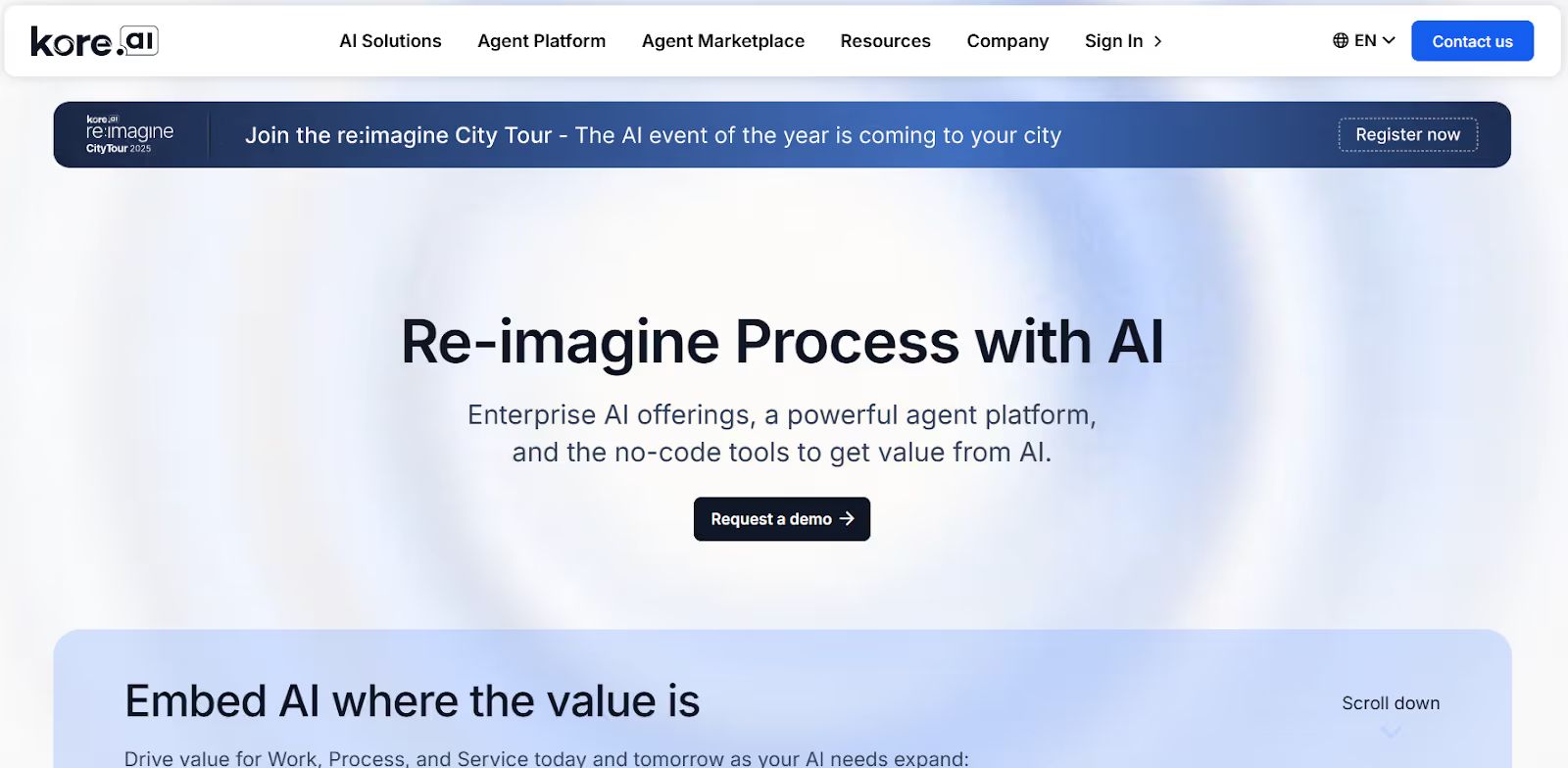
Kore.ai is a no-code platform for setting and running voice agents. The XO Platform enables both customer-facing and employee workflows across various industries, including banking, healthcare, and telecommunications. It manages natural conversations, accommodates complex integrations, and provides flexible deployment options—whether in the cloud, on-premises or hybrid environments.
The platform offers omni-channel communication, so the bots created using Kore.ai can be integrated with multiple channels like websites, mobile apps, messaging apps, and voice interfaces. So, it's ideal for businesses who want to scale their communication game with AI voice bots.
Kore.ai features:
- Marketplace with prebuilt solutions: Kore.ai comes with various prebuilt AI voice agents and solutions tailored to the requirements of various industries like banking, healthcare, retail and insurance.
- AI-driven automation: Kore.ai supports workflow automation, allowing bots to handle complex processes, automate repetitive tasks and perform backend integrations.
- Integration with enterprise systems: The platform allows integration with 75+ out-of-the-box popular CRM and ERP systems. Kore.ai features platforms like XO, Search AI, and GALE to enable businesses to build, deploy and manage voice agents.
- Data security: Kore.ai comes with enterprise-grade security standards, along with other industry standards like GDPR, HIPAA, etc.
Pros:
- Supports flexible deployment, including on-premises installations
- Intuitive visual flow builder for both chat and voice applications
- Robust NLP capabilities with strong multilingual NLU support
- Integrated analytics and reporting tools
- Enterprise-ready with prebuilt templates and connectors
Cons:
- Lacks a dedicated sandbox for prompt testing and iteration
- It has a steep learning curve, especially for small or non-technical teams
- Documentation is limited, and update logs are often sparse
- Pricing is not transparent and may not be ideal for startups
- Cloud-hosted flow versioning can be cumbersome and hard to manage
Ideal Kore.ai use cases
Since Kore.ai offers prebuilt voice agent templates for HR, IT helpdesk, healthcare, and BFSI. These industries can use the platform for various use cases, including:
- Banking (customer onboarding, loan processing)
- Insurance (claims processing, policy management)
- Healthcare (patient support, appointment scheduling)
- Retail (personalized shopping assistance, order tracking)
They can easily use these templates by doing some minimum customizations to align with the brand.
Why choose Kore.ai over Parloa?
Kore.ai provides an omnichannel platform designed to help businesses seamlessly manage customer interactions across multiple channels such as social media, chat, email, and ticketing systems. This platform is especially well-suited for companies that emphasize integrated omnichannel communication, including those in the e-commerce, retail, travel, and hospitality sectors.
Conclusion
While Parloa provides a range of features, its latency limitation, high cost, and bad customer support can damage customer relationships.
If you're looking for a user-friendly AI phone agent platform that offers easy integration and comprehensive customization, Synthflow should be your priority.
Take Synthflow's 14-day free trial now.




